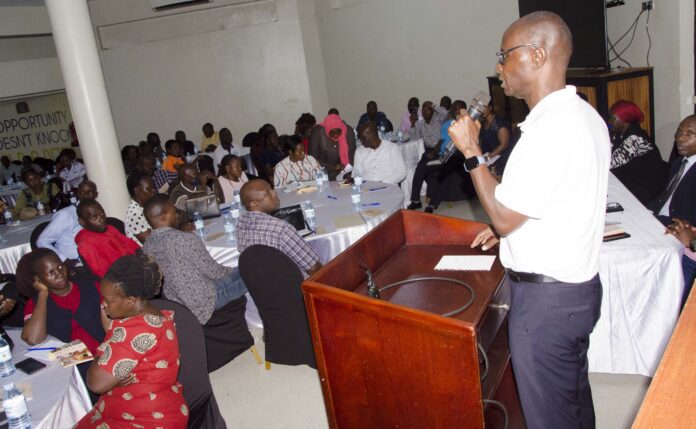
Vendors at Kampala’s Kalerwe and St. Balikuddembe (Owino) markets are set to benefit from a new government-backed financing initiative known as the Katale Loan.The low-interest loan scheme, targeting low-income earners, will be disbursed through the Microfinance Support Centre (MSC) at an annual interest rate of just 8%.
The Katale loan was introduced following a directive from President Yoweri Museveni aimed at empowering market traders by easing their access to capital and according to State House officials, the pilot phase will focus on Kalerwe and Owino markets, with plans to expand to other markets in the central region based on its success in Kampala.
The program is expected to benefit over 10,000 vendors across 24 sub-markets within Kalerwe and many more in Owino.
During a stakeholder meeting held at Fairway Hotel, Moses Byaruhanga, Senior Presidential Advisor for Political Mobilization, assured vendors that the initiative is designed to protect them from exploitative moneylenders.
“Moneylenders have been unfairly earning a lot from your struggles. But now you are going to get access to loans with dignity, no national IDs as collateral and on non-exploitative terms,” Byaruhanga emphasized.
He said that the loans will be disbursed by MSC without requiring traditional security and encouraged Vendors to organize in small groups of 5 to 10, which will collectively verify a borrower’s credibility.
“No physical assets are required. Once approved, funds will be sent directly to the trader’s mobile money account, eliminating unnecessary bureaucracy,” Byaruhanga added.
He also addressed past concerns from vendors who feared that market upgrades might result in rent hikes or land grabs. He clarified that the government only improved markets where vendors had given their consent.
“We only improved the markets that accepted. The rest, sadly, remain in poor conditions,” Byaruhanga stated.
The meeting brought together over 200 participants, including women traders, market leaders, local council chairpersons, and officials from Kampala Capital City Authority (KCCA).
Vendors welcomed the Katale Loan and pledged to keep politics aside to ensure the initiative benefits all traders.
Dalawusi Kibuuka, vice chairperson of Ddembe Market in Kalerwe, promised to raise awareness among his fellow vendors. Meanwhile, Winnie Nalwoga from Nyanja Zone in Owino urged KCCA to streamline the loan process to avoid delays that might drive vendors back into the hands of moneylenders.
Responding to sanitation concerns, David Musunga, KCCA’s Deputy Director of Production and Marketing, acknowledged the limited space but pledged that KCCA would work with MSC to improve service delivery.
Julius Kasirye, KCCA’s Manager of Commercial Services, praised the vendors for their entrepreneurial drive and stressed the importance of Kalerwe and Owino markets in shaping the future of the initiative.
“Kalerwe and Owino are Kampala’s flagship markets. If this loan fails here, it will derail our plans to support other markets. Let us make this work,” he told attendees.
MSC officials clarified that the loan is available to Ugandan adults aged 18 to 75. Applicants must open bank accounts to ease transactions. The scheme targets small business owners, roadside vendors, stall operators, and especially women and single mothers.
Lotah Arimureeba, Client Relationship Officer at MSC, noted that funds will be released within two weeks of submitting the necessary documents like photocopies of the national ID, NIN, and an endorsement from a market representative.
“Sometimes vendors find it hard to access finance, but through this government-backed scheme, MSC provides the funding to help your businesses grow. We are not affiliated with any political party,” she said.
As the Katale Loan gains momentum, it represents a significant step by the government to uplift small traders and shield them from predatory lending practices.
With affordable interest rates and simplified access, the program aims to boost livelihoods and business growth in Kampala’s vibrant markets. If successful, it could pave the way for a nationwide rollout bringing hope to many in Uganda’s informal sector.














